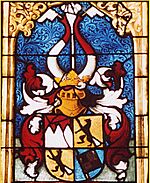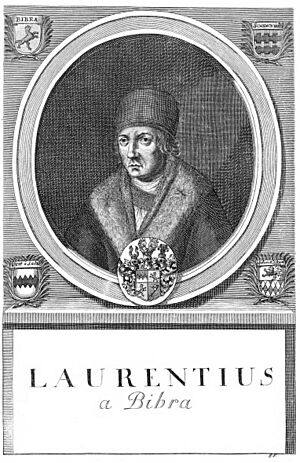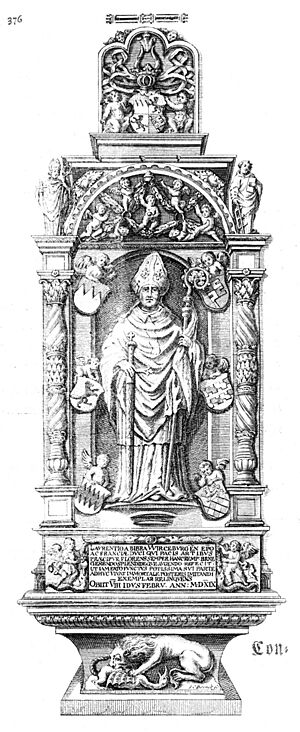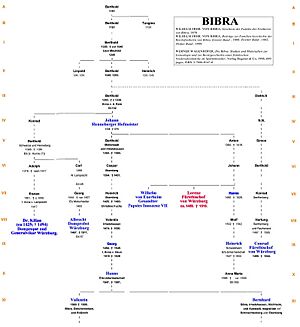Lorenz von Bibra facts for kids
Quick facts for kids Lorenz von Bibra |
|
|---|---|
| Prince-Bishop of Würzburg | |
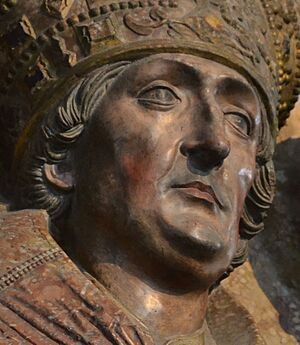
Detail of tomb by Tilman Riemenschneider in Würzburg Dom (cathedral) (c. 1460 - July 7, 1531) in Würzburg Dom (cathedral)
|
|
| See | Würzburg |
| Appointed | 10 July 1495 |
| Enthroned | 11 October 1495 |
| Reign ended | 6 February 1519 |
| Predecessor | Rudolf von Scherenberg |
| Successor | Koenrad von Thüngen |
| Orders | |
| Consecration | 11 October 1495 by Heinrich Groß von Trockau |
| Personal details | |
| Born | 1459 Mellrichstadt |
| Died | 6 February 1519 (aged 59–60) Würzburg |
| Denomination | Roman Catholic |
| Coat of arms |  |
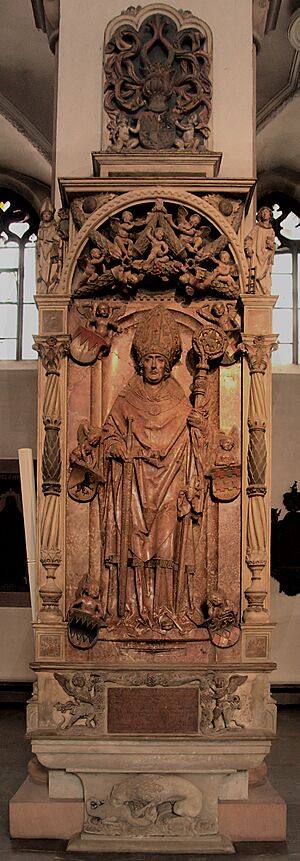
Lorenz von Bibra (born 1459 in Mellrichstadt, died February 6, 1519, in Würzburg) was an important religious leader. He was the Prince-Bishop of Würzburg from 1495 to 1519. A Prince-Bishop was a bishop who also ruled a territory like a prince. Lorenz lived at the same time as Emperor Maximilian I (1459–1519). Lorenz also served as an advisor to the Emperor.
Lorenz went to school at Vessra Abbey and studied at several universities. These included Heidelberg, Erfurt, and Paris. In 1487, he wrote a letter to Pope Innocent VIII for his half-brother Wilhelm. Wilhelm was going to the Vatican as a messenger. Sadly, Wilhelm died in 1490 while returning from Rome. His grave can still be seen in Santa Anastasia Church in Verona.
People liked and respected Lorenz as a ruler. He was often asked to help solve arguments between others. He believed in German humanism, a movement that focused on human values and reason. He also wanted to bring good changes to the Catholic Church from within.
Contents
Lorenz von Bibra and Martin Luther
Their Meeting and a Special Letter
Lorenz von Bibra and Martin Luther met and got along well. Luther arrived in Würzburg on April 18, 1518. He had a letter from Duke Frederick the Wise of Saxony. Lorenz offered Luther an escort to the Heidelberg Disputation. Luther declined because his friends from Erfurt met him. This meeting happened just before Luther's disagreements with the Catholic Church became very serious. It was also shortly before Lorenz died in 1519.
After their meeting, Lorenz wrote a letter to Duke Frederick the Wise. He told the Duke:
"Your beloved Excellency you should not allow this pious man, Dr. Martin Luther to leave your boundaries because something unjust might happen to him."
This meant Lorenz thought Luther was a good person and should be protected.
George Spalatin, a friend of Frederick the Wise, wrote about the letter:
"The Bishop’s words pleased Frederick the Wise so much that he copied the letter with his own hand and sent it to me at Lochau."
Frederick the Wise was a very powerful man. He became Luther's biggest supporter during the Reformation.
What if Lorenz had Lived Longer?
Historians have wondered what would have happened if Lorenz had lived longer. Many believe that if he had, the Würzburg area might have become Protestant. This is because Lorenz seemed to agree with some of Luther's ideas. He was known for having an open mind about the Roman Catholic Church. He also did not like the selling of "indulgences," which were like pardons for sins.
Lorenz's Thoughts on Monasteries
Lorenz also had interesting views on monasteries and convents. A friend of Luther, Spalatin, shared a story. He said that if a nobleman asked Lorenz for money to send a child to a monastery, Lorenz might say:
"I prefer you would give your daughter to a husband instead of putting her in a convent. Do you need money for this? If so, I will lend it to you."
This shows that Lorenz thought marriage was better than joining a convent. He also seemed to dislike the strict life of monks and nuns.
Luther himself once commented on Lorenz's actions. There was a fight among some young church members in Würzburg. One of them lost a hand. Lorenz "jailed" them in a monastery. Luther later said:
"If the Bishop of Würzburg ever saw a bad fellow, he would say: Only the monastery for you; you are of no use either to God or to your fellow-man."
This suggests Lorenz saw monasteries as a place for those who couldn't fit in elsewhere.
Pilgrimages to Grimmenthal
A chapel was built at Grimmenthal in 1498. Many pilgrims visited, and a larger church was built there in 1502. Luther was not happy about this. He called it a "big fraud of the devil." He said that people left their jobs to go there. Luther also noted that Lorenz, the Bishop of Würzburg, did not speak against these pilgrimages.
Present Day Influences
The meeting between Luther and Lorenz inspired a short play. It was called Luther bei Lorenz von Bibra. Deacon Dr. Günter Breitenbach wrote and performed it in 2007. Lorenz is also an important character in the 2010 historical novel Die Königin der Gaukler by Guido Dieckmann.
Lorenz von Bibra and Tilman Riemenschneider
Lorenz had a good relationship with the famous sculptor Tilman Riemenschneider. Riemenschneider was also once the mayor of Würzburg. Lorenz asked him to create an altar for a new church in Bibra. He also hired Riemenschneider to make grave markers for his predecessor, Rudolf von Scherenberg, and for himself. Today, these two gravestones are side by side in the Würzburg cathedral. They are made of the same stone but show different art styles: late Gothic and Renaissance.
Lorenz von Bibra and Johannes Trithemius
In 1506, Johannes Trithemius became the abbot of the St. Jakob zu den Schotten monastery in Würzburg. This happened because Lorenz von Bibra offered him the position. Trithemius was famous for his writings. The word steganography comes from his book Steganographia. This book was about cryptography (secret codes) and steganography (hiding messages). His book Polygraphia (1518) was the first printed book on cryptography.
The von Bibra Family
Lorenz appointed many of his relatives from the von Bibra family to government jobs. His successor, Konrad II von Thungen, also did this, even more so. The von Bibra family was an important noble family from Franconia.
Other famous members of the family include:
- Wilhelm von Bibra, Lorenz's half-brother and a papal messenger.
- Conrad von Bibra, who also became Prince-Bishop of Würzburg (1490–1544).
- Heinrich von Bibra, a Prince-Bishop and Prince-Abbot of Fulda (1711–1788).
- Ernst von Bibra (1806–1878), a naturalist and author.
 | Roy Wilkins |
 | John Lewis |
 | Linda Carol Brown |


